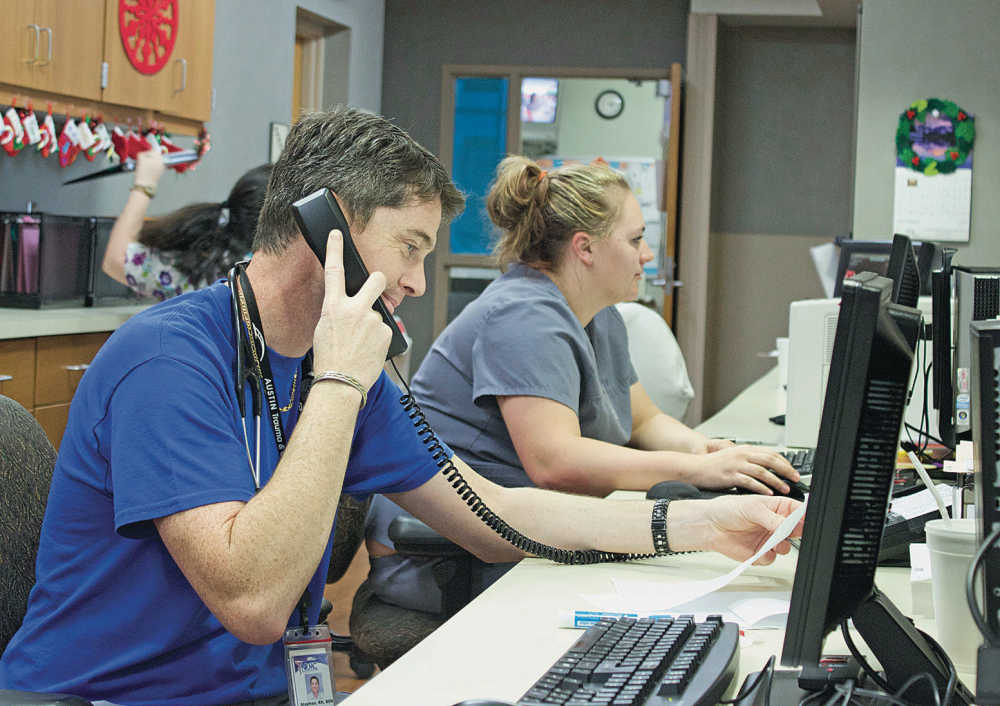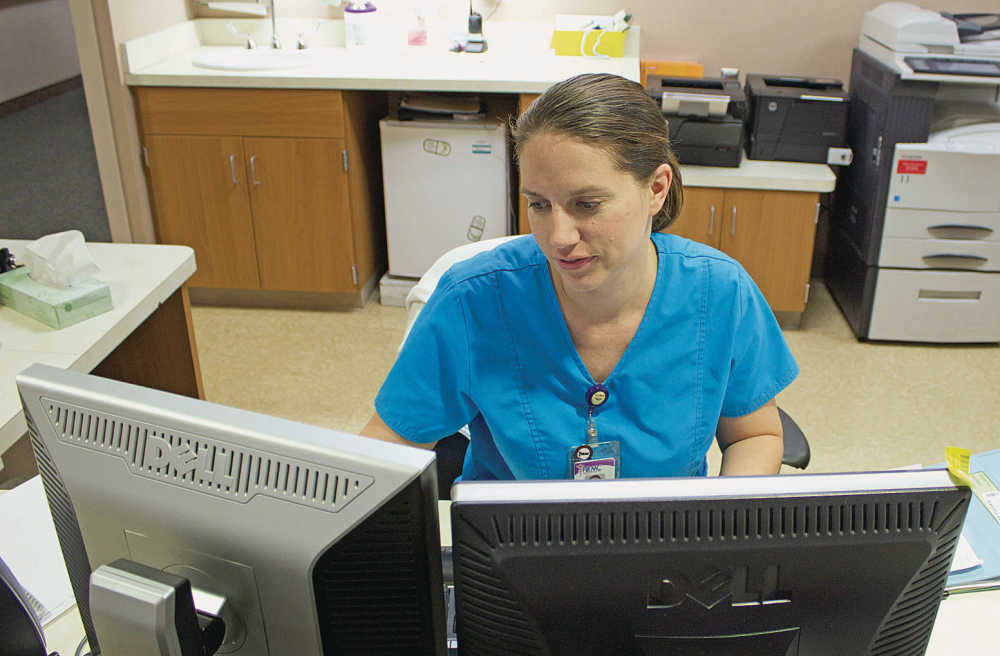Recruiting changes made at NRMC to entice new nurses

Nevada Daily Mail
The registered nursing shortage has led to new ways of recruiting nurses at Nevada Regional Medical Center, as well as attempting to alleviate pressures for active nurses who may burn out quickly.
Candi Dahmer, a human resources recruiter for NRMC, said advertising and recruiting has had to change in order to lure nursing graduates to their hospital, instead of losing them to hospitals in Joplin or Kansas City.
"Historically, we could run an ad in the newspaper or post something on our website, and we would get enough [responses to the ads]. Now we have to be more creative," Dahmer said. "Especially with the population of new nurses that are being recruited to all different areas."
Dahmer said the medical center courts nurses before they graduate with dinners, in depth discussions of benefits and about once a month, they participate in job fairs to get the NRMC name in front of recruits.
"Rather than waiting on them to come to us, we are having to go to them," Heather Brockmeyer, administrator in the human resources department of NRMC, added. "We are really having to be proactive and going after them before they graduate, so they know what is available to them in their community and talking to them about the organization in terms of clinical skills that would be applicable, but also what benefits does working for the second largest employer in the community do for them versus going to a hospital in Kansas City or Joplin."
Brockmeyer said appearance on social media is an important factor to recognize because if a patient posts a message on Twitter, Instagram or Facebook in a negative way, it can impact anyone who reads it. The same goes for a potential hire reading a tweet or post.
Brockmeyer said the registered nurses NRMC employs have plenty of room to grow, making NRMC a good fit for recent graduates.

"If we hire a new graduate, and they work on the med-surg floor, which is where you would go if you were dehydrated from the flu or had just had surgery and need pain medicines," Brockmeyer said. "That's usually a great place for a new RN because it gives you a lot of diversity, but it's not the high acuity."
From there, she said nurses can be moved up to the intensive care unit, where more intense patient care and higher skill level is needed to take care of patients.
According to Missouri Hospital Association and the Bureau of Labor Statistics, health care is expected to have the fastest employment growth, adding at least 394,900 hospital jobs by 2024. The health care sector is roughly projected to add 736,000 in nursing jobs and residential nursing jobs.
"We have been told there will be a growth, and I don't disagree with that," Brockmeyer said. "That sounds like a big number -- it is supposed to grow annually by 19 percent between 2011 and 2022 -- but the demand for nurses is going to outweigh the supply."
If the hospitals demand is more than the supply of nurses, the shortage of nurses will create a need for current nurses. New nurses could demand higher wages and are more in control of the market.
"Think about the 1980s when the Cabbage Patch dolls came out. There were thousands of them made, but millions of little girls wanted them. Cabbage Patch made a killing on dolls. Same here, we have hundreds of nurses graduating, but we have thousands of jobs needing to be filled."
One of the reasons the supply and demand will not balance is because the baby boomers are retiring and needing the health care, Brockmeyer said. As projected, there is not enough population in the nursing field behind the baby boomers to "get enough people through a college class to get them in to fill the jobs to take care of those baby boomers."
Another unhelpful turn of events for small, rural hospitals like NRMC is hospitals in cities are beginning to require nurses to have bachelor's degrees instead of the two-year associates degree previously sought after.
"They are hearing that in order to get a job, they have to go and get a four-year degree. So, we have an added two-year span where we don't have nurses because they are going straight into their bachelor's [degree]," Brockmeyer said.
"Our recommendation is, come start with us as a two-year associate RN. Get in there because every area is so specialized. Get in there, get some hands on skill and start determining where your best application of skills is going to be."
Brockmeyer said NRMC "loves it" when RNs with associate degrees from local nursing schools apply, because it sees the opportunity to grow their own.
Another reason for the shortage, Brockmeyer said, was nurses can tire out from being overworked because of a hospital being short staffed. Their overworking leads to fatigue, then early retirement from the nursing field.
A study published by Mary Blegen and colleagues from the University of California, San Francisco in the April 2011 issue of Medical Care, found higher nurse staffing was associated with fewer deaths, lower failure-to-rescue incidents, lower rates of infection and shorter hospital stays.
Brockmeyer said having smaller nursing staffs having to cover the same amount of patients can be stressful for nurses because they may have to limit time for each patient.
"I think the time that a nurse will be able to dedicate to each individual patient will be limited.
I do not believe at NRMC, our staffing to patient ratio will change. If we truly could not hire enough nurse staffing we would have to transport [patients] to another facility.
"I don't envision that happening. I think we are proactive in our recruiting to go to those schools. Make sure those students know what NRMC is about. They come here for their clinical rotations and have hands-on, side-by-side [training] with our existing nurses
"I also see where a nurse who is always having to pick up one additional shift gets tired physically and burns out in their career."
Brockmeyer said she has read "a multitude" of studies, which talk about professional burnout. She said nursing and medical care has one of the quickest burnouts.
"Their job is more comparable to a Wall Street financial broker. It's just always on demand, always there, always a need," she said. "And so to accomplish that you see them burn out instead of 50, they are burning out at 35. That's where the concern comes from. If you don't have enough staffing, then you are asking [your staff to pick up extra shifts...] but are we burning them out on the career to where they no longer want to be present?"
Brockmeyer said she worried the nursing staff here was burning out because she wants to take care of the staff as if it were family. NRMC practices "Adjust Culture" where a punitive response is not given if a mistake is made. Instead they work toward not repeating a mistake.
"If we look at it and say no matter what nurse, doctor or HR person was in that role, the mistake still would have happened -- the process is broken," she said. "The process of having to put extra demand on our staff because when you do see the staff get tired, they are statistically more likely to make a mistake. Maybe a mistake the patient never knows about, but a mistake nonetheless."
Brockmeyer said the goal for medical staff is to be perfect all the time, and when there is a mistake because their process is broken, that is where concern lies with nurses or other medical staff being burned out. She said because NRMC does not practice mandatory overtime, they are able to prevent overworking fatigued nurses.
Hours worked per nurse shift at NRMC depend on what the job requires. The med-surg hospital shifts last 12-hours for nurses; in surgical services, the shift lasts eight hours, Brockmeyer said. NRMC modifies the shifts for the kind of work the nurses are doing. If a nurse is working in surgery, an eight-hour shift is necessary to allow the nurse time to sleep while she is off and to have her be more alert when they are on the job.
In med-surge, the RN's prefer to work three 12-hour shifts, Brockmeyer said. This allows them to have time off to rest and spend with family.
With only projections guiding hospitals and nursing schools through these difficult times, Brockmeyer said a lot can change based on decisions made at the governmental levels.
"I think it's going to be interesting to watch the Missouri board of nursing, the licensing official, to see what changes come about because there's not only the shortage in nursing, but there's a huge shortage in physicians. There's a lot of nursing practitioners out there, so we're seeing nurses go to nurse practitioners but not necessarily to the MD level," she said. "Health care as a whole is changing daily. The other side is the governmental piece, do you want to work yourself to death if you work for a place that says 'financially we are on our feet, but that could change any day.' Whatever the lawmakers decide has an impact and a trickle down effect. So that is a piece that the shortage of health care workers can't measure."
